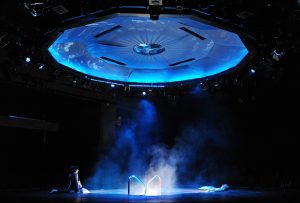1. Gene-shifting theatre doesn't have to be difficult.
Breaking new ground in theatre is the aim of Canadian director Robert Lepage and his group Ex Machina. It seems like everything is unusual about 'Playing Cards: Spades': playing floor, lighting, seating around the stage, the stories, the acting and the surprising denouement.
2. 'Playing Cards: Spades' shows that clichés still work.
Gambling, luxury hotels, show, eroticism, fake romance, luring lights flashing in all colours, and on the selves: the toiling staff, often illegal, for whom the money doesn't ring a bell. Anyone who thinks of Las Vegas quickly envisions these ingredients. 'Playing Cards: Spades' is full of them, and some more things that have been shown many times before. But Ex Machina ties these well-worn images together so nicely that you are curious about the characters from the start. What are they looking for in Las Vegas?
When at the beginning a physicist and a romantically inclined woman get married in Las Vegas, it is immediately clear that it will be nothing between the two, but the honeyed speech by the wedding officiant dressed as Elvis is witty and immediately makes you feel that the way things will go wrong is less easy to predict.
3. You will experience Las Vegas differently.
Those who go to Las Vegas seek the fairy tale of money flowing around. The gambling city is a secluded area. The turbulent world news seems far away. Until suddenly, harsh reality briefly makes itself heard. It is 2003. President Bush announces on TV the war in Iraq. Does this affect Las Vegas? Cracks are appearing in this little paradise. And they are hurting.
A wonderful invention by Ex Machina is to place another closed world alongside Las Vegas: a fake Iraqi village in the desert, where soldiers are practising to join the real war. There, too, the illusion reigns, the appearances of the patriotic soldier. And here, too, harsh reality rattles at the door daily.
4. The lighthearted style makes the tragedy all the more poignant.
In a quick succession of scenes, we see the intertwining stories of a large group of people. All appear to be dragging their distress and longing for redemption behind them. And all fall into the deadly vortex of disappointment. The newly married woman soon falls for an exciting man in a cowboy hat. A TV company producer struggles with strangling money problems. Aspiring soldiers sag under the commander's roar and intimidation. A chambermaid is sick but also illegal and therefore cannot go to the doctor. And a vague hippy with occult tendencies roams the dark desert around it. So it teems with people, all with their dire life histories. You are gleefully led into that world and before you know it, you feel how the confines of the little world turn out to be an ever-tightening stranglehold.
The whole crowd of people is played by just six actors. They manage to give each of them their own character, truly flesh-and-blood people. A great achievement.
5. The story fabric is brilliantly crafted.
It is incredible how the stories are intertwined. So much happens and yet everything is clear, thanks to a secure structure. Everything blends into the flow, which at some point reaches a point where you feel: we are being sucked into an inescapable waterfall.

6. Rarely does a set contribute so much to the tension of a performance.
The stage consists of a circular elevation, with all sorts of hatches from which characters, furniture, entire bars, hotel rooms and a swimming pool emerge and sink back in, with doors that straighten and fold back down when needed (an ongoing funny item, with an ingenious space illusion) and with a rotating outer ring. Underground, players have to follow a carefully mapped out route to emerge in the right place at exactly the right time in the right clothes and with the right props. The audience sits around the stage on all sides. This gives a sense of transparency. Everything is visible from all sides. And it is precisely this transparency that so draws you into the passing fates. Even you imagine yourself for a moment one of the players at the gambling table illuminated by warm light.
7. The boundaries of personal dramas are thrust open.
For many characters, their stay in Las Vegas ends disastrously. You see an exciting mix of fatalism and things that turn out to be not so bad after all. The fairy tale of money and the flight into romance are increasingly pinching. People are being squeezed to death by it. But then Lepage breaks through the confines of all these concrete stories and opts for an absurd twist, which is nevertheless completely believable. The TV man seems saved. He has made a big score in the gambling hall. But instead of going home, he chooses to head into the desert. Strange decision. What goes on in his brain is a mystery. Everything that protects him is peeled away from him. Wandering naked in the desert: what an image! And then he meets the fuzzy hippy. Only now do the boundaries in his brain really break open.

7 1/2. Those with a nostalgic bent are also in for a treat.
Throughout the performance, you feel the fate symbolism of the characters of the card game. 'Playing Cards: Spades' is part 1 of a four-part play based on the card game. The spades represent war and violence. Wonderfully relatable moment is the scene in which the Elvis impersonator performs the American version of the 'talking-song' 'Het kaartspel', once performed in Dutch by Cowboy Gerard. A molasses-sweet mixture of army sentimentality, cowboy melancholy and good old-fashioned bible-thumping. It is a brilliant invention to bring this endearing song out from under the dust in this performance.

RT @culturepress: 7 ½ times: looking surprised at 'Playing Cards: Spades' http://t.co/PTWnc5S86h
Comments are closed.